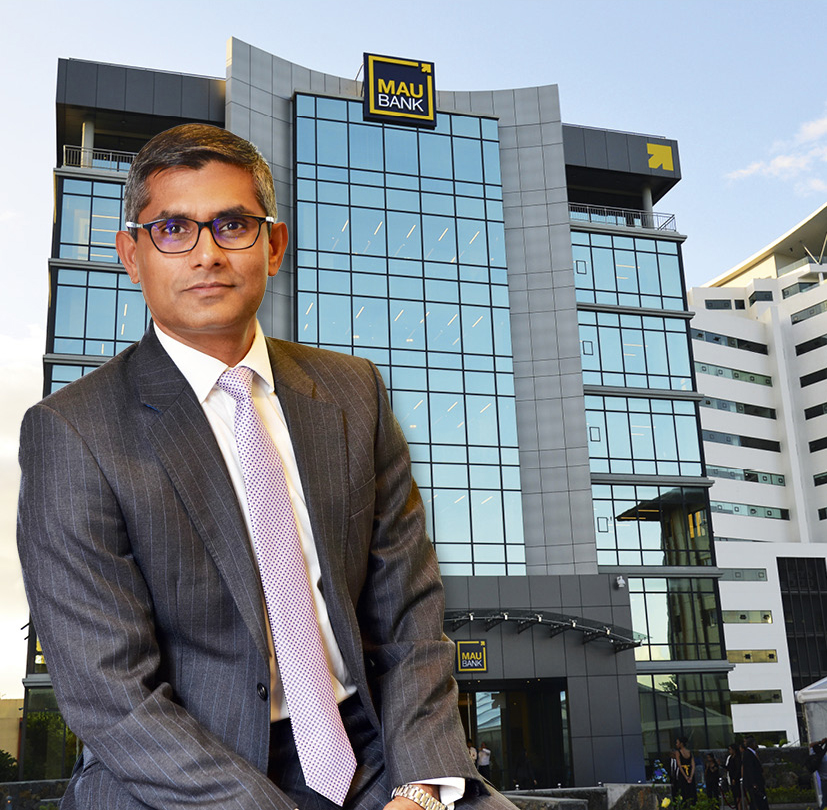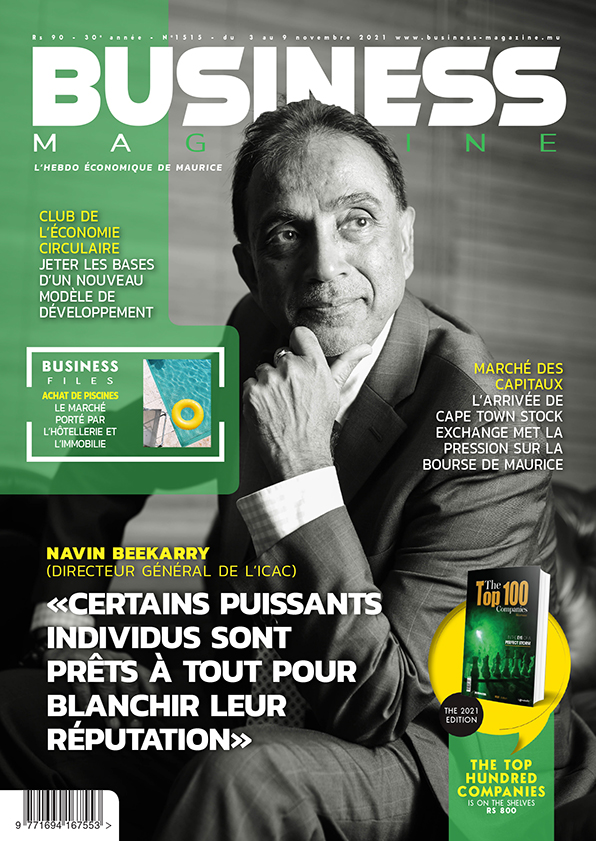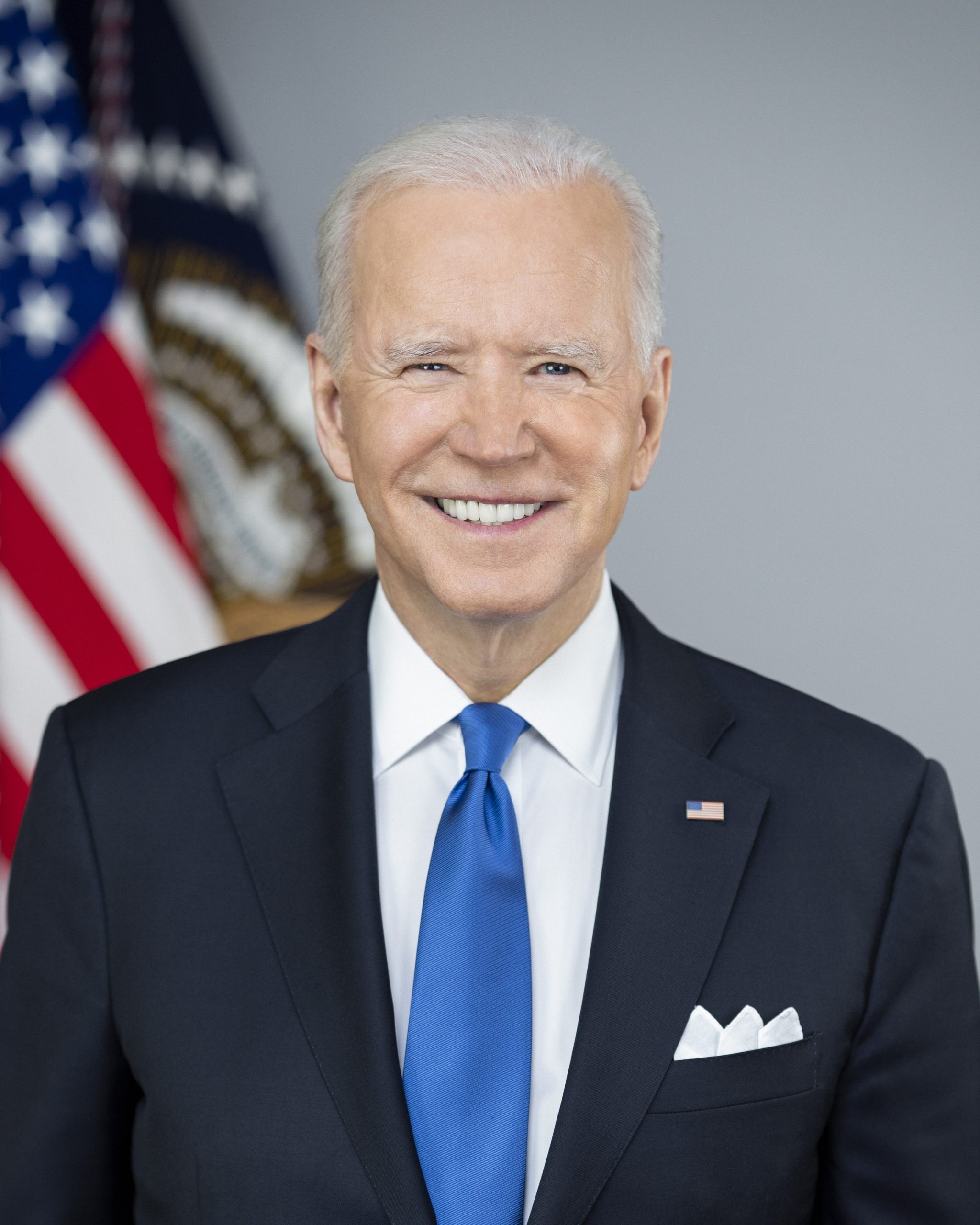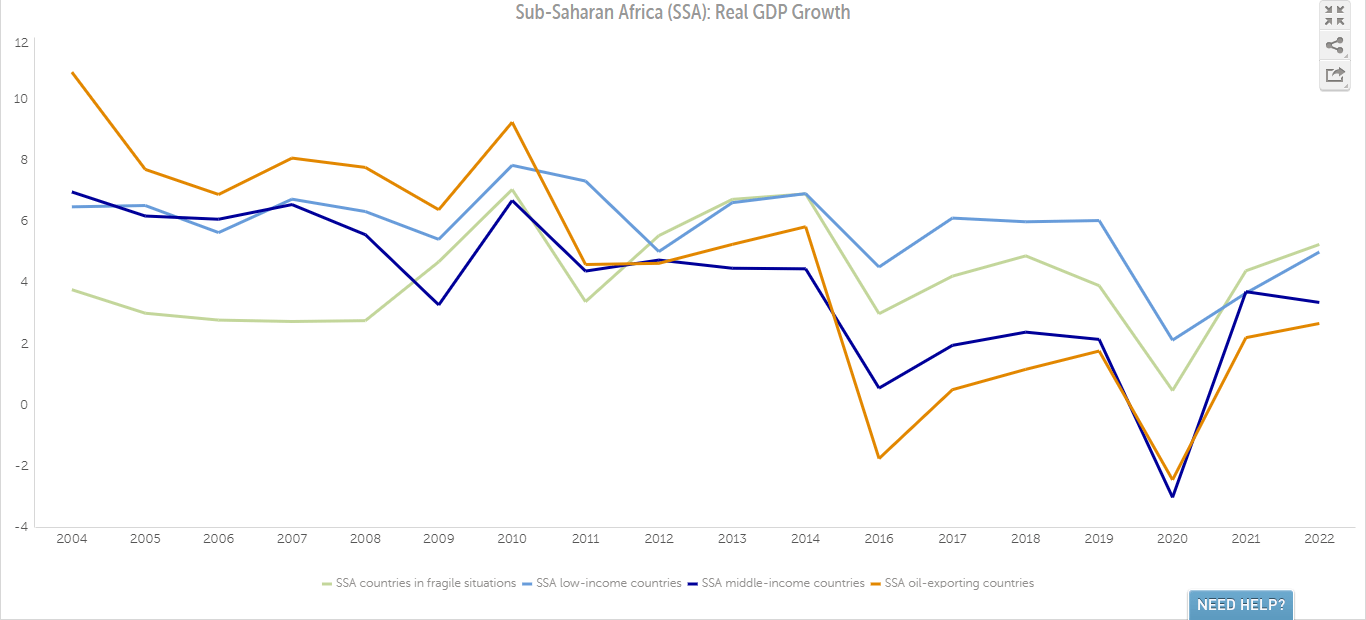Sridhar Nagarajan (CEO, MauBank): “Rs 5 to 6 billion expected from the sale of 30% of MauBank”
Share

Born out of the fusion of the ailing ex-NCB and ex-MPCB nearly a year ago, MauBank is already generating double digit profits during its new financial year, says its CEO. The aim is to achieve Rs 150 million of profit after tax for the financial year ending June 2017.
BUSINESSMAG. How is MauBank performing since you took over as Chief Executive Officer and the rebranding in January?
We’ve taken huge strides concerning our turnaround situation. Since January, we’ve only covered ten months, which is a short period of time in the turnaround of two pretty much failed banks. The first milestone is the branding of the bank which was launched on the National day weekend. I think everyone agrees that it is a very successful brand. It is very crisp and clear in its communication.
The second big milestone was on the 4th of January, when we merged the two entities and came up with unified branch and ATM fee. The third important milestone is the 23rd of May – a big day from a banking merger perspective because both the operating systems of NCB and MPCB were merged. Usually, it takes 10 to 12 months to do so: we did it in five months. That in itself is a big evidence of the talent this bank has. Almost 200 staff did the testing over two months and it was done mostly on weekends. That was the third evidence that this bank is set for greatness. We closed our financial year on 30th of June and we have pretty much cleaned up most of the legacy issues with the large provisions. We’ve started our new year on 1st of July and that’s where the fourth important milestone comes: the strong vetting of banking professionals that MauBank comprises. Many professionals from various departments of other reputed banks in Mauritius have joined us since our new financial year.
The fifth milestone is the type of foray we are making into clientele, in large corporates. We are engaging with almost all of the big corporates. The last and most important milestone is since we started doing SME lending in March. We’ve learned a lot and really started applying the concept of “accompagnement”, which is our theme with SMEs. We are different from other banks and really work with SME clients to see how we can help them. We have already supported 34 individuals with around Rs 10 million of loans and 17 corporates. Much more is in the pipeline.
We have approved in total Rs 70 million’s worth of facilities. While it may not seem like a lot, all of that is given to start-ups, without any security. These facilities would have been rejected by any other bank. So we are very proud to work with them. We are almost doing the job of an incubator. Every week, we are approving four to six proposals. We have a real challenging future and a lot of work to do.
BUSINESSMAG. Are you satisfied with the demand MauBank has been receiving?
Yes, even in consumer banking, which is a bit of a long story, since we need to recalibrate our branches. Our branch which we opened in Rodrigues is extremely successful. We have started a full exercise of consumer banking strategy and will make large scale changes to it. We cannot upset what is being done without a clear replacement. We have come with a full strategy roll-out with a consultant and it will all be done in the first quarter, where we will make big changes. Everything concerning our revamp will come in 2017.
BUSINESSMAG. MauBank was originally designed to be a bank for SMEs in particular. Are you still headed in that direction?
We fully understand that MauBank is not just a commercial bank. It is one when it comes to retail and corporate banking but when it comes to SMEs, we are both a bank and a development financial institution. That is why we have adopted the theme of “accompagnement”.
We have not taken the eye off the ball. From December 2015 till August, which basically is the period when MauBank has come into existence, the lending to SMEs under the MBA sponsored scheme has grown by 14 per cent across all banks. Banks have done well. The same scheme for MauBank has grown by 30 per cent. We are already a large SME lender. 26 per cent of our assets are already lent to SMEs. This shows that we are growing by leaps and bounds even at a time when we were so occupied with other things.
I am also very proud of the clusterisation we have put into place. For example, we have a clear understanding of lending for bakery projects and do it very quickly. We have also started working with large corporates. For example, if they are setting up something and want the retail network to be done by an SME, then we tie up with them and do the proposal very quickly. My team and I took a trip to Malaysia to learn and met with a lot of institutions. We are now adopting some of their strategies. The second strategy we have is to slowly push a bunch of microenterprises into small ones, small ones into medium ones and medium ones into large enterprises within five years’ time. “Accompagnement” is about moving people into the channel.
BUSINESSMAG. Where do MauBank’s plans to expand into other countries stand as at now?
We have come up with a three-year strategy. It took six months but we got it approved by the board and they are happy with it. As part of this strategy, we have said that most probably this will be in the third year because it requires profit making. Right now, our focus is on SMEs and domestic banking. But at the end of the strategy, we have decided that if we really achieve our plans in the first and second years and generate around Rs 300 million profits in the third year, then we will open representative offices in five places: Johannesburg, Nairobi, Dubai, Mumbai and Singapore. Basically, we feel that these five offices will give us coverage needed. Our current focus however is completely domestic.
BUSINESSMAG. Are we on target for this strategy?
Yes, but it has just been rolled out. The strategy comprises six pillars. One of it in corporate banking entails how we make profit as an SME. We are good at lending money to SMEs. We are almost seen as a development financial institution for SMEs. As regards corporate banking, we are looking at the higher end. As far as consumer banking is concerned, we are rolling it out. Our cost encumbrance ratio is very high. We need to bring it down compared to our competitors. That is because we are carrying a lot of NPAs (non-performing assets). The legacy is actually impacting our profitability. The NPAs are sitting since the deposits are still serviced. That is why we are working with our shareholders to once and for all give us the capital to clear this legacy.
Since August, we made a profit for the two months on a clean basis with no impairment. It is a small margin but a double-digit profit nonetheless.
BUSINESSMAG. Is MauBank still on target for profitability by June 2017?
For sure. We have cleaned up most of the baggage. There is still some remaining but for that capital has to come. Whatever mistakes have come in the past, we will collect it. Having said that, you cannot collect more than 25 per cent, let’s be realistic. That also will be collected over a period of time.
Government has helped us with Rs 3.3 billion, which almost takes care of a large portion of that NPA but there is a large amount remaining. Government has been very supportive as a shareholder and I cannot ask for a more effective board. There is absolutely operational freedom and it’s proven.
I am saying this openly: I took a big risk coming here to transform this bank. I have not been let down, while even Finance Ministers have changed. The commitment to MauBank has not changed.
BUSINESSMAG. What about political interference? You were categorical about that in an earlier interview…
I have already completed one year in September and I can now say with full confidence that government has been very mature when dealing with MauBank. There is absolutely no interference in the day-to-day management of the bank.
The proof is in the pudding. We are one of the fastest banks when it comes to decision making on the market. Yes or no, we will decide immediately. With MauBank, a decision will come quickly. There is a process in place. Even if I want to help, it is the process who decides. I think government appreciates that and together with our shareholders, they don’t interfere in the process at all. We are a process-driven bank.
BUSINESSMAG. Coming back to profitability, what are your expectations for FY17?
It is a bit early for estimates. We have got double-digit profitability in the first two months. I am targeting a Rs 150 million profit after tax (PAT) for June 2017 but I will be happy with Rs 100 million since we have expenses and our cost encumbrance ratio is very high.
BUSINESSMAG. The ex-NCB used to bank a lot with the Top 100 companies. Is it still the case for MauBank?
True. That is why we have split the bank into three business units. Focus is important. The first one is SME which I directly look at; I am the business head for it. The second unit is Corporate banking and treasury. On this front, we are streamlining our international banking offering to the management companies/GBC1s. We have already recruited a manager for that. We are also streamlining and modernising our leasing business because Mauritius Leasing was a very good leasing company. When it is part of a bank you realise that it has been losing focus. Leasing is a very important product for large corporates. We are also working with them, since we are very quick at decision making. That is very important for them. We get back to them with a proposal within a week. It is a big competitive advantage. Finally, the third one is consumer banking. We are the third largest domestic bank and have a good story of consolidation. When two banks are brought together they are in a better position to compete with the giants.
BUSINESSMAG. What has been the main driver of profit for these last two months?
The main driver is obviously corporate banking and treasury. The second one is SME and the third one is consumer banking. SME is our strength. We do very well with them.
BUSINESSMAG. The bank has been facing criticisms for writing off some of its non-performing loans. What has motivated this decision?
It is a good question. See, a bank impairs assets. When it impairs assets, the assets are classified as doubtful or substandard. Simply put together, it means that: can you collect something or not? When an asset is impaired, Bank of Mauritius requires that you provide for it, if for three consecutive months interest is not paid. The NPL legacy exceeds Rs 4 billion.
This is what we inherited from NCB and MPCB. This is the amount of assets which are impaired. Under that, if you go to our balance sheet of June 2015, we have provided Rs 2.1 billion.
Now, the question auditors will ask is whether this is provisioning. Are you going to collect? The truth is, as said earlier, that maximum we can get is 25 per cent.
Basically, we are conservatively saying that these assets need to be written off. It has nothing to do with what we do with a client. This is about our balance sheet management. A good bank should not have non-collectible assets. It is about cleaning the balance sheet which should be nimble. We are taking the decision to write off Rs 825 million out of Rs 2.1 billion because in our view it goes through a humongous challenged process.
BUSINESSMAG. Who is MauBank’s auditor?
It is the firm Deloitte, who has just been appointed, and it is going to be very tough. I am very determined to collect as much as possible of the legacy assets. Do you know how many companies we have put into administration or receivership and how many sale by levy we have done? We are extremely tough. Some of the criticisms coming from certain members of Parliament I don’t want to mention arise because we are too tough. Government is not trying to give capital to MauBank for its core operations. The past has to be cleaned up. Any shareholder of a bank has to take care of that.
BUSINESSMAG. We spoke last time about finding a strategic investor for MauBank. Where do matters stand?
The good thing is that we have already started. We have prepared an investor presentation. Government itself has initiated some conversations at a G-to-G level with some very good institutions. So the work has started. We have already started conversations. We are not able to proceed quickly because anyone will first ask for an audited balance sheet and ours has just been completed. We will pick up pace soon and have the audited balance sheet this month (November).
We have prepared the pitch to find a strategic investor, to which government has agreed and is being quite supportive. It takes around six to eight months to find a good investor. I think government would prefer a banking group eventually. Feelers have come from local groups and international proposals have come in as well. We believe that we will get better valuation once we do a little bit more turnaround. We would like to quote a good valuation and hopefully in Q1 2017 we can show a strong momentum and then ask for a good price.
Our intention is if we can sell 30 per cent to get Rs 5 to 6 billion, it is a big win and a return for the tax payer. In this way, not only have you transformed a fickle situation, but also made it extremely profitable. The remaining 70 per cent will increase in value if you get a strategic investor. Not only are we fixing MauBank, we are also turning it into a profitable proposition for the taxpayer.
BUSINESSMAG. Does it mean that the preference for the strategic investor leans towards a banking group?
That’s up to the shareholder to decide. As CEO, I cannot comment. But I feel the governance becomes much better if there is a strategic investor. He can bring in his own banking knowledge. We would be very happy if we sell 30 per cent and get Rs 5 to 6 billion.
We’ve salvaged a complete economic collapse which would mean Rs 30 billion of deposits would have to be repaid and government has infused around Rs 3.3 billion. Most importantly, credit has to go to government for having put in a professional management, for not interfering and giving support.
BUSINESSMAG. What are your comments on the current political climate? After a new Finance Minister, it seems we have a new Prime Minister-in-waiting. As CEO of a bank which is influenced a lot by local politics, how do you view this situation?
It’s a pertinent question. I will view it from a business perspective because I represent the business community as a banker. I think political certainty is good for business. What has happened during the last few months is very good because it gives certainty. For me, certainty is good. We cannot deny that, during the last few months, there has been a lot of certainty in the way things have been settling down. The Budget is being implemented by Ministers with a very clear focus and it allows clients to invest. We cannot deny that things are moving into an area of predictability and I am positive about predictability.
}]








